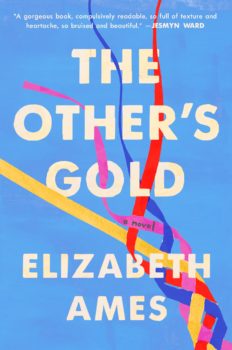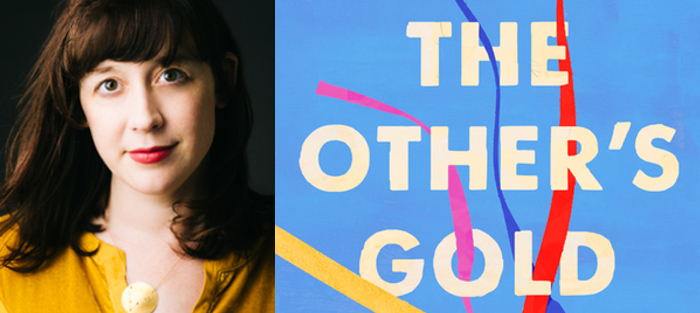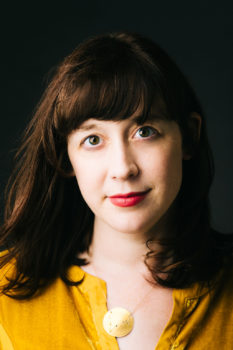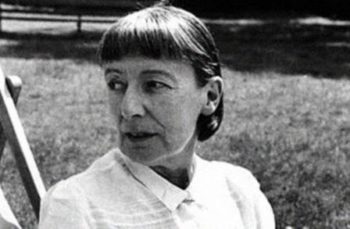Elizabeth Ames’s debut novel, The Other’s Gold (Viking), focuses on a close-knit group of four women who meet in their first year at the fictional Quincy-Hawthorne College, and follows them into their adult years. It’s a gorgeous, deeply intelligent, bold book.
Elizabeth and I have been friends since our MFA days at the University of Michigan, and in the years since we’ve continued to share work. She’s not only a talented novelist but an astute, incisive reader. Her ability to capture the intricacies of human interaction—and her attention to not only joy and sorrow, but also the places where they merge and blur—is pitch perfect: her work is keenly aware that we must understand despair to fully understand beauty. Her fiction seems equally comfortable with quiet contemplation and bold gestures, a trait I love. And what I first admired about her work, and continue to admire, is the way she is able to push her characters to the brink while simultaneously holding them in compassionate high regard. The Other’s Gold does all this and more.
It was a pleasure to speak to Elizabeth recently about her work, which we did back-and-forth via email in the days leading up to the book’s publication last month. She lives in Cambridge, Massachusetts.
Interview:
Natalie Bakopoulos: The novel’s focus, structurally, is centered around a particular transgression or mistake each character makes. The Other’s Gold seems to be, among many other things, preoccupied with choices, irrevocable choices, and circumstances, and the lasting and reverberating consequences of both those things. What do you see as your preoccupations as a writer, and how do they emerge in The Other’s Gold?
Elizabeth Ames: My preoccupation in writing and life is with people: what they think about each other and believe about themselves. I care about character above all else, and think so often of Zadie Smith’s writing on this topic, where she channels Iris Murdoch: “It is, Murdoch once said, incredibly hard to make oneself believe other people really exist in the same way that we do ourselves. It is the great challenge of art to convince ourselves of this fundamental truth—but it is also the challenge of our lives.” That idea is a constant touchstone, and my life’s work—I try and fail every day to recognize the “inviolable reality of other people,” in life and in fiction, and I’ll never stop trying.
This preoccupation emerges in The Other’s Gold, I hope, in how real the characters feel to a reader, and also how the characters see one another in the book, how they are forced to navigate the consequences of their friends’ worst acts, how they themselves shape those consequences (or lack thereof). If, as you suggest, some mistakes are irrevocable, then our friends cannot rescue us. Redemption is elusive. Is recognition the best we can hope for? To be fully seen? What does it mean to truly see the people we love, and to let them see us? If we really see them, can they come to exist to us in a way closer to the way we exist to ourselves?
On the topic of intimate friendship—on the desire to be seen and to see—your novel brought to mind Elena Ferrante’s Neapolitan quartet and Toni Morrison’s Sula. The Other’s Gold, though, is about a group of four friends, and this exploration of the complicated interactions among a group of friends and the way these complications—and sorrows, and joys—resonate throughout a lifetime made me also think of similarly structured books such as The Interestings, The Secret History, Emperor’s Children, and A Little Life, to name a few. I love a college novel in particular, one that begins in college and follows the characters into their adult lives. And The Other’s Gold is right up there with the best. Can you talk a bit about the seed of the book—either the first glimmers of the idea, or an image, or a moment?
 I love a college novel, too, Natalie! And I’m living in the heart of a college campus, in a college dorm no less. In retrospect it seemed inevitable that I would write a campus novel—how could I resist? The seed was planted when I moved to the dorm in the summer of 2016, just before the school year began. I would walk around, newborn baby strapped to my chest in a carrier, and observe students as they traveled in close clusters, fascinated and alienated in equal measure, and a bit envious, too. I didn’t have an intense friend group like this in college, and I wondered so much what it would be like—the relief of it, as well as how claustrophobic it might feel. Like the students I lived alongside, I was also in a period of intense transformation and identity reconfiguration, so while our respective life stages felt sometimes comically distant (try breaking up a college party in your postpartum pajamas), I also felt there were rich connections to explore in this stretch of time between leaving home and forging families with friends up to the point where people are starting their own families, making decisions about partners, careers, and children.
I love a college novel, too, Natalie! And I’m living in the heart of a college campus, in a college dorm no less. In retrospect it seemed inevitable that I would write a campus novel—how could I resist? The seed was planted when I moved to the dorm in the summer of 2016, just before the school year began. I would walk around, newborn baby strapped to my chest in a carrier, and observe students as they traveled in close clusters, fascinated and alienated in equal measure, and a bit envious, too. I didn’t have an intense friend group like this in college, and I wondered so much what it would be like—the relief of it, as well as how claustrophobic it might feel. Like the students I lived alongside, I was also in a period of intense transformation and identity reconfiguration, so while our respective life stages felt sometimes comically distant (try breaking up a college party in your postpartum pajamas), I also felt there were rich connections to explore in this stretch of time between leaving home and forging families with friends up to the point where people are starting their own families, making decisions about partners, careers, and children.
Leading up to the move, I had been writing lots of notes about the feelings I had as a new mother, and the book began with my wish to both preserve and dramatize some of the overwhelming emotional complexity of that time.
Speaking of overwhelming emotional complexity, this can also be applied to your exploration of friendships, which are often more consuming than love affairs—they are, in fact, like love affairs. To me, The Other’s Gold is also about the reflexivity of friendship, the way the boundaries of the self are forever changed by it: in fact, a character might become so fixated by another’s actions it’s as though they’re attempting to not only understand their friend, but also themselves.
Yes. I find this permeability endlessly fascinating, and certainly, friendship has been a sustaining force in my own life, as essential and complex as any romantic entanglements. There’s a way in which our friends’ decisions can feel, at times, like judgements on our own even if they are not meant as such (especially when it comes to forging paths into adult lives from youth: finding meaningful work, choosing partners, having children—choices that can jeopardize the primacy of a friendship). We do so much reshaping of ourselves during this stretch of life, and who we fit with/how we fit as friends. That shape changes sometimes, too. And the richest friendships, the most intense ones, you are right—they change your boundaries. You can become so enmeshed and in love that your friends’ stories and memories can feel like your own, or like part of you, of your life. And this in turn shapes how you understand yourself.
In contrast, of course, those boundaries blur again, as when one of the characters tells another: “I’m not talking about you … right now, I’m talking about me [emphasis mine].” Of course, nothing in a friendship is ever really just about ourselves, or the other, but about that mutual interaction. And also perhaps a certain kind of self-focus, maybe even a self-protection, that keeps us from seeing other’s pain, should it take away from our own joy. Were you conscious of this sort of intersubjectivity, and can you talk a little bit about the various ways it plays out in the novel?
That dance can be so delicate! To really give yourself over to listening to and feeling your friends’ pain is such a loving thing, so generous. Thinking of that phone call you mention makes me consider the ways in which the needs within a lasting friendship can fluctuate, and sometimes you need so much from your friend in the way of listening, and other times you hope you can be the one listening. You’re passing pain and pleasure back and forth over years and years and asking your dearest friends to look, and again really see, what it means to you without thinking of what it means to them, or measuring it against their own pains and pleasures. I am conscious of this intersubjectivity, and think you’re right that it does play out in terms of self-preservation in the book, especially in the last section, where the characters are more explicit about both the desire, the morbid curiosity, really, to see what their friends’ pain has wrought when it’s concealed from them, but also their wish to look away when asked to look at the evidence of this pain.
Ji Sun describes her own pain as transforming her into “an undersea creature, all her sumptuous blacks sodden, her hair tentacles, reaching out to try to strangle anyone within reach, and if no one came near enough, wrap back around her own neck. But there were always people near enough. That’s who they were to one another—the ones willing to reach without dwelling on the risk. The ones who would enter the room when it reeked of despair. The ones who would not turn away.” True friendship, true love, must be entering that room even when it might hurt you to do so.
Yes! I was thinking of that moment, in fact. Toni Morrison writes in Sula: “They found relief in each other’s personality.” I kept thinking of that line as I read. Your title, of course, says this as well, and also suggests that what the other has is admired, envied, or even coveted. Some of the things that annoy, hurt, or bother these characters about one of their friends might also be what they’re drawn to in the first place.
I love that line, that book, and that idea of the relief and rest you find in a friend’s personality, the way you can feel so at home. Margaret is maybe the clearest example of the ways in which what you gravitate towards in a friend can also chafe—her friends love her childlike wonder, and her insistence on joy, but they are frustrated by her lack of responsibility. Or with Lainey, they love her intensity, but tire of her restlessness. The best parts of our friends (and ourselves!) are often wed to those parts that are most difficult, don’t you find?
Absolutely.
I was also interested in that tension you mention, about what our friends have and how admiration can creep into envy and covetousness, and the ways in which various kinds of wealth can complicate relationships. Economic differences can feel somewhat less pronounced when people are in college, eating together in the dining hall, but they sure start to show themselves once people graduate and get on career tracks. Think of those early post-college meals, the different ways people order in restaurants, and, maybe even more revealing, how they talk about splitting the bill. There’s this jostling to be generous, or seen as such, or to be seen as successful, or not struggling, even among dear friends! A lot plays out around a restaurant table when the bill arrives.
Envy operates in other ways, too, as Lainey covets Margaret’s beauty, and Margaret longs for parents like Lainey’s. Alice is wrecked with jealousy at the ease with which her friends become pregnant, and her friends envy her her meaningful job and lovely partner. These are all different kinds of wealth, and the characters are conscious of this, of their respective riches, and the ones they still seek. And also of the ways in which your friends’ riches can become your own (explicitly, as when Lainey’s rent is subsidized by Ji Sun’s family money, or more amorphously, as when Ji Sun describes Margaret’s beauty as buoying everyone in her orbit) while also remaining beyond your reach.
Friendship, of course, is just a topic, and a large one, and so many novels could be classified this way. More specifically, and more interestingly, to my mind, is the idea of power. The book’s topic might be friendship, but power is the lens through which it’s explored. There’s a line that stood out to me in the first third of the book that mentions “an uglier kind of power,” and I couldn’t help but think that this could almost be another, darker title for the book: An Uglier Kind of Power. How do the characters, in your mind, deal with power, both in positive terms (e.g., agency, empowerment), and more negative, uglier ways? Was there something about power in particular that you were drawn to explore?
This is such an insightful question; thank you. And yes, I do see power as an animating force in the book. From the outset, I was interested in threats to children, how the characters move from facing threats from within their own families of origin; from institutions that stand in for family and friends who become like family; and finally, from within themselves, towards their own children and families. You could trace a related line mapping how they relate to power, trying to reclaim power that was wrested from them in the first half of the book, feeling like they failed to employ the full force of their power, or, later, abusing their own powers as they become adults, and mothers.
I remember reading an essay by the actress Jemima Kirke when she was starring in Girls, and she wrote about having her new baby in a stroller on the narrow subway platform near the train, the terror of that power. It wasn’t a suggestion that she would ever do anything to harm her baby, just that she had this immense power, and what on earth qualified her, or anyone?! She described how a moment’s terrible impulse could become an unforgivable mistake, writing, “I was more powerful than I ever wanted to be.” I’m very interested in that idea of having too much power, why some of us know we have too much, and for others the desire for power is unending. Sometimes I wonder if the ways in which some women are able to be so harrowingly familiar with this power over a vulnerable new human satisfies some primal urge that some men have to sate in other ways —that people are raped and wars are waged because men haven’t known this intimacy with someone completely at their mercy. This is sort of the inverse of Louise Erdrich’s notion (from The Blue Jay’s Dance) that “Perhaps we owe some of our most moving literature to men who didn’t understand that they wanted to be women nursing babies.” She writes of nursing her baby and the “sense of oceanic oneness, the great yes, the wholeness….” She continues: “the sense of a self merged at least temporarily—it is deathlike. I close my eyes and see Frost’s too peaceful snowy woods, but realize that this is also the most alive place I know—Blake’s gratified desire. These are the dark places in the big two-hearted river, where Hemingway’s Nick Adams won’t cast his line, the easeful death of the self of Keat’s nightingale.”
I’m interested in the intersection of obliteration and power, how not having access to or not experiencing in some other way the obliterative oneness that comes for some women when nursing their babies, one has to go out and find it or make it elsewhere, and how that process might be constructive or destructive, or, for most of us, some combination thereof.
The line you quote about power comes from a moment where Lainey is making a distinction between the pain she causes—we all cause—as participants in/beneficiaries of capitalism (i.e., how many people experienced pain so you could eat this single chocolate bar?) versus the kind of pain caused by an individual wielding his power over someone directly, who not only saw that pain on a person’s face and didn’t stop, but sought still more. This is an uglier kind of power indeed. Capitalism can feel almost like the weather to someone reared in it, and even if the end result is the same, I prefer a plane struck down by calamitous weather than by terrorism; harm done by someone who means to do harm has always felt more frightening to me.
I agree. Of course, there’s also the sort of harm done that is inescapable, that is neither malicious nor intentional, and that can sometimes be the hardest to deal with.
The book refers to a poem by Stevie Smith, “Not Waving but Drowning.” The allusions are subtle but stunning. The line “I was much too far out all my life” hits me so hard, each time I read it. We have a tendency to assign importance or significance to one event in our life, one moment, without considering all the other things that might have led up to that moment. What, in your mind, is the relationship of this poem to your characters? To their choices? To The Other’s Gold, as a whole?
What a fundamental and fatal miscalculation in that poem! In a book obsessed with how we see one another, the idea that we could mistake waving and drowning is quite desperate, I fear. I love the line you mention, too, and think for all of us that idea of being “much too far out” is a moving target, and we might surprise ourselves at where we put that line at various times in our lives. How far can we go, how far is too far, who sets the boundaries? If friendship is the shared shore, sometimes you’re standing on solid ground, and sometimes you’re the one at sea. Your friends are your port and your lighthouse, but they’re also drifting out into the waters, mapping their own boundaries, and they can’t always see you clearly, or bear the responsibility of being your safe harbor. Margaret’s in the water at the end of the book, and she’s waving. In that moment, I think she sees her friends clearly, even if she is the one submerged. None of her friends know what she’s been through; they don’t know the abuse she endured in childhood, and they don’t realize how harrowing her postpartum experience was, either.
These things don’t fit the story they tell about her, or the story of their friendship. It was important to me that Margaret be aware of this; she knows what kind of story she wants to tell about herself. We tend to discount survivors, both their joy and their expertise (in being experts about both abusers and abuse, and in knowing how they want to deal with their trauma), and to foreclose on the stories they want to tell about themselves by insisting on dictating the terms of their survival or recovery (triumphant or nonexistent, as the case may be). The book is interested in the consequences of facing trauma, and of refusing to, and suggests that both have their costs. So I can’t say what to make of that final wave Margaret gives, and her suggestion that they still have time. They do, they do. But still, it makes me sad to think of how wrong they sometimes are. The book ends in 2015, and the four are feeling excited about Hillary Clinton and Bernie Sanders in the primary. A lot of us mistook some drowning for waving that year.
Yes. That we did.
Thank you so much for talking with me, Elizabeth, and congratulations again on this brilliant debut.








